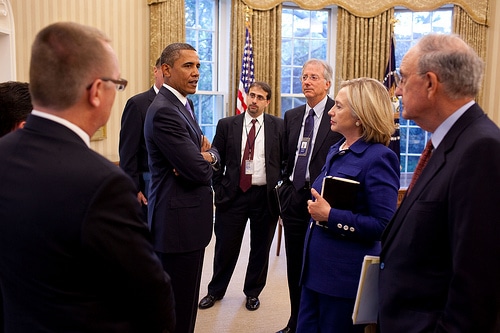 Too late and good riddance!
Too late and good riddance!
“Dennis is the closest thing you’ll find to a melitz yosher, as far as Israel is concerned,” said the Anti-Defamation League’s national director, Abraham Foxman, who used the ancient Hebrew term for “advocate.”
by James M. Wall
After working for five US presidents, Dennis Ross has resigned his position as President Obama’s chief Middle East advisor.

President Barack Obama talks with members of his Middle East Policy team, including from right, George Mitchell, special envoy for Middle East Peace;
Secretary of State Hillary Rodham Clinton; Dennis Ross, senior director for the Central Region; and Dan Shapiro, senior director for the Middle East, in the Oval Office, Sept. 1, 2010. (Official White House Photo by Pete Souza)
Note: Leftmost person in the photo with back to the camera is Jeffrey Feltman, the Assistant Secretary for the Bureau of Near East Asia Affairs)
Presidents Reagan, Bush I, Clinton, Bush II and Obama, all arrived at the White House determined to recast the nation’s role in finding a permanent peace between Israel and the Palestinians.
Sometimes immediately, sometimes later, one man was involved in shaping how the US dealt with peace between Israel and the Palestinians. At first his role was small; but by the time he went to work for Bill Clinton, George W. Bush and Barack Obama, he had become the key player in the process.
That man is Dennis Ross, a non-lawyer, who has been called “Israel’s lawyer”, by former State Department official, Aaron David Miller.
Rashid Khalidi, Edward Said Professor of Arab Studies at Columbia University, and a former colleague of President Obama’s at the University of Chicago, was asked by the Institute of Middle East Understanding (IMEU) for his reaction to Ross’ departure. His response:
“Since the Reagan administration, Dennis Ross has played a crucial role in crafting Middle East policies that never served peace, which is today farther away than ever.
His efforts, which contributed to the growth in the number of Israeli settlers in the occupied territories from under 200,000 in the 1980s to nearly 600,000 today, were marked by a litany of failures.
It is long overdue for him and the bankrupt policies he represents to be shown the door.”
Diana Buttu, former legal advisor to Palestinian negotiators and a current Fellow at Harvard’s Kennedy School of Government, told IMEU:
“Dennis Ross has done more to undermine the rights of Palestinians and set back their struggle for freedom and equality than any other American official”.
Jim Lobe included this background information in his analysis of the Ross resignation story:
One senior U.S. diplomat, Ambassador Daniel Kurtzer, who took part in the Clinton-era negotiations, cited a number of anonymous officials who were critical of Ross’s mediation in the 1990s in his book co-authored with Scott Lasensky, entitled “Negotiating Arab- Israeli Peace”.
“The perception was always that Dennis started from the Israeli bottom line, that he listened to what Israel wanted and then tried to sell it to the Arabs,” one Arab negotiator told them. “…He was never looked at …as a trusted world figure or as an honest broker.”

Ross is a political in-fighter, a skill he employed to land his final post in the Obama White House.
MJ Rosenberg wrote in January of this year, that President Obama’s special envoy George Mitchell and Obama’s White House adviser Ross, were engaged in a turf war to control Obama’s Middle East policy. Ross won.
After Mitchell resigned, Nathan Guttman wrote in the Jewish Daily Forward:
Ross’ strong ties to Israel now make him indispensable to the administration. Those ties include his previous role as head of the Jewish People Policy Institute, a Jerusalem-based think tank founded by the Jewish Agency for Israel.
Rosenberg points to another “money” quote in Guttman’s story from another Jewish leader, Abe Foxman:
“Dennis is the closest thing you’ll find to a melitz yosher, as far as Israel is concerned,” said the Anti-Defamation League’s national director, Abraham Foxman, who used the ancient Hebrew term for “advocate.”
Rosenberg concludes:
Think about it.. The lobby considers the guy in charge of US policy toward Israel an “advocate” for Israel, which he is. (Foxman’s honesty is a rare delight).

When Ross leaves the White House at the end of this month, he will return to the Washington Institute for Near East Policy, a spin-off agency created by AIPAC.
Ross worked with a variety of titles for five US presidents. But wherever he hung his hat, his Zionist loyalties were clearly evident to those he served and shaped, in the media/religious/political leadership bubble that shields American decision makers and decision-shapers, from seeing any Middle East reality except the Zionist version.
An Associated Press story from Jerusalem, published in Ha’aretz this week, reports the conclusion of one of Ross’ final tasks for Obama, blocking President Abbas’ path to the Security Council and protecting Obama from having to cast a UN veto.
The Palestinians are slated to receive some 200 million dollars in U.S. security assistance after a top House Republican ended her hold on the money.
Rep. Ileana Ros-Lehtinen, the chairwoman of the House Foreign Affairs Committee, informed the Obama administration in recent weeks that she no longer would block 50 million dollars in economic support funds for the Palestinian Security Forces and 148 million dollars in other assistance.
In separate letters to the State Department and USAID, Ros-Lehtinen cited President Barack Obama certification that the funds were in the national security interests of the United States as well as word that the government of Israel did not object to the assistance. The letters were sent in September and October.
 Rep. Ros-Lehtinen has the power to block funds that do not answer “yes” to her question: “Is it good for Israel?” The question is narrow. It reflects her limited vision of what is good for America.
Rep. Ros-Lehtinen has the power to block funds that do not answer “yes” to her question: “Is it good for Israel?” The question is narrow. It reflects her limited vision of what is good for America.
The Congresswoman put a “hold” on the funds because Palestinian President Mahmoud Abbas had the audacity to secure an overwhelming victory in a vote for Palestinian admission to UNESCO. It is not nice to “fool” Mother Ros Lehtinen. For doing that, Abbas had to be punished.
An earlier vote in Congress in the 1990s, had already automatically put into law an automatic blocking of funds to any UN agency that grants membership to a Palestinian “entity”. Once UNESCO embraced the Palestinians, the money stopped. That 1990s vote comes under the heading of ”AIPAC’s long-range planning”.
President Obama asked Ros-Lehtinen to lift the block on the funds she was holding back.
Obama, Ross or another underling, explained to the Congresswoman what she already knew, there was another important vote on Palestinian membership coming up in the Security Council.
Obama spent considerable US chips to make sure that President Abbas would not be able to win that Security Council vote. Abbas needed nine votes to force an inevitable US veto.
He had a good reason to believe he might find that total.
The Security Council voted 14 to 1 earlier this year on a resolution condemning Israel’s settlement building expansion , requiring that single voter, the US, to cast its veto.
The word went out from Washington to the Security Council members that Obama does not want to have to cast another veto.
Another message had to be conveyed to Ros Lehtinen to sweeten the deal with wavering members on the Security Council. The message: Let the money go.
The President assured Ros-Lehtinen, so says the AP story , that she could sell this sudden change of heart as dollars well spent because it is “in the national security interests of the United States”.
The Congresswoman most likely had another question, the one that must always be asked when the US takes any action that affects the State of Israel: “Do we have Netanyahu’s blessing?” The answer came back, yes we do.
With this much pressure on the Security Council members, President Abbas realized he could not get his nine votes in the Security Council.
He decided to shift his strategy to securing an upgrade to an observer “non-member state”, the same status currently held by the Vatican. This would not be “full membership” but implicitly, it would recognize Palestine as a state.
Without the work of Dennis Ross and his colleagues during five US presidential administrations, Israel, AIPAC and the Israel Lobby, might still be struggling to solidify Israel’s total control over Washington. Dennis Ross performed his task well.
Elliott Abrams writes a blog within the friendly confines of the Council of Foreign Relations, where he is a senior fellow for Middle Eastern studies. Abrams sees Ross’ resignation as a plus for the Republicans:
Ross’s departure is not a diplomatic problem for the White House; it is instead a problem for the Obama re-election campaign.
For Ross was the only official in whom most American Jewish leaders had confidence. As most of them are Democrats who have long accepted Ross’s faith in the “peace process,” they viewed his role as the assurance that a steady, experienced, pro-Israel hand was on or near the tiller.
When the White House did something that clearly harmed U.S.-Israel relations (such as the recent Sarkozy-Obama exchange on how difficult it is to deal with Prime Minister Netanyahu, where Sarkozy called Netanyahu a liar and Obama appeared to agree), or made foolish demands of Israel (such as the 100 percent construction freeze), and when the tone of the relationship clearly became far worse than it had been under Clinton or Bush, Jewish leaders comforted themselves that Dennis was still there.
 Abrams previously served in the administrations of two Republican presidents, Ronald Reagan and George Bush II.
Abrams previously served in the administrations of two Republican presidents, Ronald Reagan and George Bush II.
Unlike Ross, who crossed party lines in his diplomatic posts, Abrams is a staunch Republican. Should President Obama lose in 2012, Abrams would be an early favorite for a position under the next Republican president, none of whom have any expertise in Middle East affairs.
Abrams knows the territory from his neoconservative perspective. Abrams’ as the next Israeli loyalist in the White House, is a strong possibility. Wikipedia has this to say about Abrams’ previous work with Republican presidents:
During the Reagan administration, Abrams gained notoriety for his involvement in controversial foreign policy decisions regarding Nicaragua and El Salvador. During Bush’s first term, he served as Special Assistant to the President and Senior Director on the National Security Council for Near East and North African Affairs.
At the start of Bush’s second term, Abrams was promoted to be his Deputy National Security Advisor for Global Democracy Strategy, in charge of promoting Bush’s strategy of advancing democracy abroad. His appointment by Bush was controversial due to his conviction in 1991 on two misdemeanor counts of unlawfully withholding information from Congress during the Iran-Contra Affair investigation.
Abrams’ fingerprints are all over the Hamas-Fatah conflict, as David Rose explains in an April, 2008 essay he wrote for Vanity Fair.
Under the heading, The Gaza Bombshell, Rose introduced his essay with this summary:
After failing to anticipate Hamas’s victory over Fatah in the 2006 Palestinian election, the White House cooked up yet another scandalously covert and self-defeating Middle East debacle: part Iran-contra, part Bay of Pigs.
With confidential documents, corroborated by outraged former and current U.S. officials, the author reveals how President Bush, Condoleezza Rice, and Deputy National-Security Adviser Elliott Abrams backed an armed force under Fatah strongman Muhammad Dahlan, touching off a bloody civil war in Gaza and leaving Hamas stronger than ever.
George Bush II’s Deputy National Security Adviser would like nothing better than to see Dennis Ross’ departure from the Obama White House open the way for a new Republican president in 2012.
Where does this saga of negotiations delayed while Israel expands in land holdings, leave us? I suggest it leaves us in John Steinbeck country.
Steinbeck understood what power does to the powerful. He wrote his classic 1939 American Depression novel, The Grapes of Wrath, after making a trip to the Dust Bowl. He was shocked by the poverty and suffering he saw there.
Steinbeck wrote furiously, and in anger. He gave himself 100 days to finish the book.
As he wrote, his wife Carol typed his manuscript. She suggested the book’s title from the lyrics of of “The Battle Hymn of the Republic” (“Mine eyes have seen the glory of the coming of the Lord; He is trampling out the vintage where the grapes of wrath are stored… “)
In his novel, Steinbeck wrote (on page 249):
And the great owners, who must lose their land in an upheaval, the great owners with access to history, with eyes to read history and to know the great fact: when property accumulates in too few hands it is taken away.
And that companion fact: when a majority of the people are hungry and cold they will take by force what they need. And the little screaming fact that sounds through all history: repression works only to strengthen and knit the repressed.
The great owners ignored the three cries of history. The land fell into fewer hands, the number of dispossessed increased, and every effort of the great owners was directed at repression.
That sounds a great deal like Occupied Territories, in Palestine, and on the Wall Streets of the world.
Source: Wall Writings
Edited by : Debbie Menon
James Wall is currently a Contributing Editor of The Christian Century magazine, based in Chicago, Illinois. From 1972 through 1999, he was editor and publisher of the Christian Century magazine. He has made more than 20 trips to that region as a journalist, during which he covered such events as Anwar Sadat’s 1977 trip to Jerusalem, and the 2006 Palestinian legislative election. He has interviewed, and written about, journalists, religious leaders, political leaders and private citizens in the region. Jim served for two years on active duty in the US Air Force, and three additional years in the USAF (inactive) reserve. He can be reached at: [email protected].
ATTENTION READERS
We See The World From All Sides and Want YOU To Be Fully InformedIn fact, intentional disinformation is a disgraceful scourge in media today. So to assuage any possible errant incorrect information posted herein, we strongly encourage you to seek corroboration from other non-VT sources before forming an educated opinion.
About VT - Policies & Disclosures - Comment Policy



